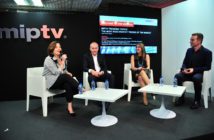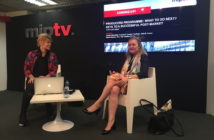What a day of masterminding! First up, we were treated to a Media Mastermind Keynote from AOL’s David Shing (aka Shingy, left in above photo).

AOL’s “digital prophet” was among the sparkiest Media Mastermind Keynote speakers in recent memory. Here is a taster of his prophecies given at MIPTV yesterday:
“I believe that innovation is the most abused word, because it’s actually more about invention,” Shingy proclaimed. “One is about change: Innovation. The other is about create: Invention.”
He also praised Snapchat’s Spectacles for appealing to consumers in a way that Google Glass didn’t, and moved on to the importance of “experience”—“technology is changing your behaviour, it’s not changing your need,” the guru said. “There is no technology that is better than human touch. We have to think about this connected human, all of us.”

He also talked about VR as an incredible experience. “You put those goggles on, you’re going to create this incredible amount of content that will allow you to change it. When you try this on, you become the director of your content.”
“The truth is, sometimes it’s better to live in reality,” he admitted, before moving on to the Internet of Things and “beautiful smart objects… if we have more efficiency, people are going to have more time, and maybe are going to want to consume more content.”
Cue slides of RFID tattoos and wearables. “What’s going to happen when you think about all these wearables that we have?” Shingy wondered. “It’s not just about fitness and health, it’s about creating more effectiveness and efficiency in your life.”
Experiential content also got the Shingy treatment—imagine clothing that can deliver a punch or hug, based on the action being watched on a screen … or a dress that morphs and changes according to the person looking at it.
“Everything you’re wearing now has built-in intelligence,” Shingy said. “If the Wearable Web is coming, you have to think about how the architecture of new content is going to be delivered on those new devices… you have to think about square, rectangular, triangular, etc.”
Shingy added, “37 percent of children under the age of two can operate a swiping device better than their parent. It’s no longer about consumers consuming your content. You now have to do it with the creator, the critic and curator of experiences … and they’ll take your brand if they want to. It’s incredible what they can do with even a little sniff of content.”
Given that today’s creators come from the group we once called audiences, he had words for that category, too. “The audiences that you’re attracting now have their audiences, so the content you publish should start when it’s published, not end. Personal expression is the new form of entertainment … There are more people dying from extreme selfies than from shark attacks!”
He added, “You’re no longer competing with advertising. You’re competing with everybody.”
Which makes staying on-track more critical than before. “Today, audiences are outpacing us … what are you going to do when the audience outpaces you? Audiences have these [smartphones]in their hands,” Shingy said. “You don’t need to have high production to have something that’s captivating … This is changing the paradigm of content creation.”
He asked, “What are you doing to reflect back the culture of people who want to make things, to hack things?”
Then Shingy moved on to the importance of context. “Video? We are freaky for it,” he declared. And it’s your business. We don’t give a shit whether it’s short-form or long-form. You can tell incredible stories, whether long or short.”
Riffing on that, “Storytelling is the most abused word in our industry,” Shingy declared. “It’s less about the telling, and it’s more about the story.”
He concluded by encouraging the industry to “allow the internet to take over and have fun with the content you produce,” before finishing off with a quote by Catherine Hepburn: “If you obey all the rules, you miss all the fun.”

Next, Jérôme Delhaye of Reed MIDEM (left) arrived onstage to introduce TF1‘s Chairman and CEO, Gilles Pellison. Variety‘s European Bureau Chief, Henry Chu, appeared onstage to give him the publication’s 2017 Achievement in TV award, after which they sat for a tête-à-tête about TF1’s future and that of the industry.
“In honoring Gilles and TF1 today, we’re recognising an important player in the TV that has global ambitions and has already gone about achieving those global ambitions,” said Chu. “TF1 is France’s highest-rated TV network, making it the most successful network in all of Europe.” He added that it is now expanding globally with content.
“Gilles has been behind TF1’s drive to set its sights high, and to take up opportunities and challenges in the digital age.”
Pelisson accepted his award with grace. “This is the 30th anniversary of TF1 being independent” from the French government,” he said, “so it’s actually a very special day for us.”
10 years ago, Pelisson told Chu in their Q&A, it was all about power—who can command the most local marketshare. “Today, we’re really looking for performance on shows, except for the 1pm and 8pm news, which remains a very large rendezvous for the French audience,” he said. “Beyond that, it’s making TF1 still the leader of this country with a 21 percent audience in terms of marketshare.”
Chu asked Pelisson how he feels about the death of linear TV. Doth the audience protest too much?
“I don’t think it’s dying,” Pelisson replied. “It’s that it’s consumed in a different way.” He pointed to his family—specifically his 19-year-old daughter, who watches TV on a PC or mobile. “But she’s watching TV,” he said. “People are using replay. Consumption in French fiction is reaching 15-20 percent of some of the best shows.”
There also remains something special about that water-cooler moment TV commands.
“A general channel like us is going to gather on special events, like soccer games or political debates, like we did a couple of weeks ago,” said Pelisson. “Most of the French population will be watching; every night at 8pm, you have 3 million people watching primetime TV in France, with an average length of 3 hours and 44 minutes.”
But it’s also true that younger generations watch less linear TV, which is why France is among the first countries measuring 4-screen audiences, Pelisson pointed out. “It’s really, how do we make sure are content is ubiquitous, that it can be watched on every screen in a friendly way?”
He explained, “What we want is to conceive most of our shows with the idea that when you go on the web, on our portal, you will get additional content”—like making-of videos, for example. “You will find plenty of stuff you won’t see on linear TV. People know about that. There is a lot of buzz and community on the web that we can activate and moderate. That creates new content.”
He also praised influencers, some of which TF1 hopes to bring to TV. “In this world, these are maybe the stars of tomorrow.”
Chu then asked what to do about the ubiquity of free content, and the resulting expectation people have that content should be free. He observed that TF1’s MyTF1 VOD service is steadily gaining share, but how can the brand convince people to pay for it?
“We are looking at fighting against piracy,” said Pelisson. “We have progress to be made, because we are far less rigorous than the US. It’s mobilising everybody.”
He also advocates protecting content by “not diluting it too much” and experimenting with new payment models, based on changing behaviour.
Last year, TF1 introduced Bright-Eyed Revenge, an 8-episode miniseries of 52 minutes per episode, and made it available for binge-watching on its replay portal.
“For the first time, as a free-to-air channel, we made people pay if they wanted to watch it as a binge instead of by episode, which is kind of its premiere,” said Pelisson. “It’s about agility. How do you change your model to accommodate evolving viewing habits?”
Chu also asked about TF1’s relationship with Netflix, whose first original show for the French market, Marseille, debuted its first two episodes on the network.
“We have mixed feelings,” Pelisson admitted, drolly adding, “One of my Harvard professors used to say ‘mixed feelings is when you see your mother-in-law driving your Ferrari over a cliff!” More seriously, “We are in competition mode and there is defining the sharing of value which is at stake.”
The question of value-sharing was illustrated with a recent dispute TF1 had with Facebook. “We had a big debate the other night with top 5 [Presidential] candidates in France,” Pelisson said, “and we couldn’t agree with Facebook on how to share the value, the monetisation on such a programme.”
TF1 worked with YouTube instead, and the footage there got 350.000 views. “So it’s constantly what they are willing to share as value, especially on long-form,” he said. “If we are producing high –value content, how do they share with us?”
He returned to the subject of Netflix, saying he believes most such companies will need local partnership, especially as they begin to produce more local content. “This is where Marseille was a good opportunity and the content team decided to take a bet, doing primetime of the first 2 episodes on TF1, launching it so people would go on Netflix to watch the rest.”
“If there is a season 2—and apparently there will be—we can broadcast season 1 in entirety,” Pelisson added. “These are new deals. There will be times when they need local players like us.”
Now TF1 is working on its own content—hopefully exporting its skills and culture to different markets. Some shows won’t even be shot in France!
“There is a seduction” to the French way of life, Pelisson said. “If you ever come to Paris, you feel the city, but then there are the people, the cafe, the interactions, et cetera, which is always intriguing to the rest of the world.” These are qualities it can use to colour characters and atmospheres, and leverage in French-origin series for other markets.
Of course, it’s also learning from its mistakes. France has finally “understood that 52 minutes was best format, not 90 minutes,” Pelisson laughed. But its evolution is moving in the direction of the international marketplace.




